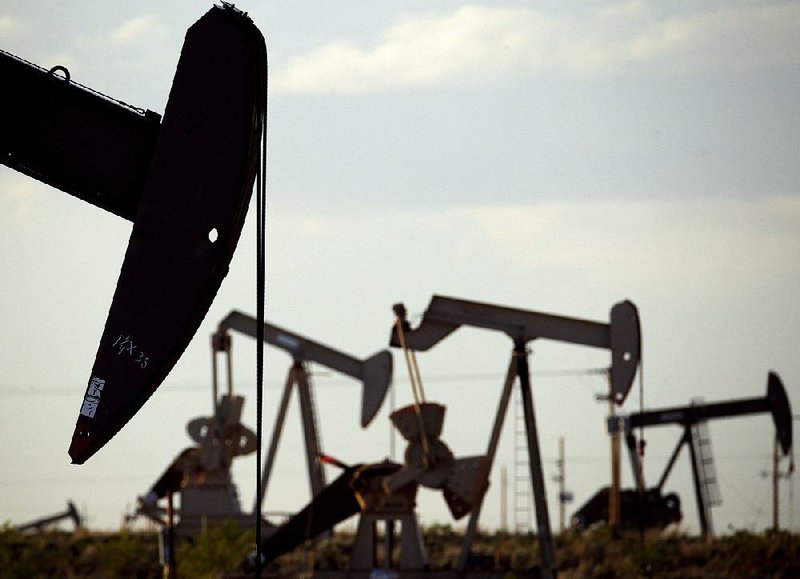WASHINGTON -- President Donald Trump's administration laid out a plan Thursday to cut back on the regulation of methane emissions, a major contributor to climate change.
The Environmental Protection Agency, in its proposed rule, aims to eliminate federal requirements that oil and gas companies install technology to detect and fix methane leaks from wells, pipelines and storage facilities. It will also reopen the question of whether the EPA even has the legal authority to regulate methane as a pollutant.
Although methane is the chief component of natural gas and therefore a valuable energy source in its own right, it is also a heat-trapping pollutant. And the methane that escapes from pipelines, compressor stations and from oil wells has been blamed for as much as a quarter of the planet's warming.
EPA officials said the new rule, which would replace one dating from President Barack Obama's administration, is a response to Trump's calls to trim or eliminate regulations that impede economic growth or keep the nation reliant on energy imports.
The plan "delivers on President Trump's executive order and removes unnecessary and duplicative regulatory burdens from the oil and gas industry," said the EPA administrator, Andrew Wheeler. "The Trump administration recognizes that methane is valuable and the industry has an incentive to minimize leaks and maximize its use."
Wheeler noted that since 1990, natural-gas production in the United States has almost doubled while methane emissions across the industry have fallen 15%.
Anne Isdal, the EPA's acting clean-air chief, said companies that opposed the Trump rollback would be free to keep abiding by the Obama-era rules if they wished. "We don't preclude anybody from going above and beyond if that's what they think they need to do from a business or compliance standpoint," she said.
Environmental advocates described the methane proposal as a big setback in the effort to fight climate change. Methane is a potent greenhouse gas.
"The Trump EPA is eager to give the oil and gas industry a free pass to keep leaking enormous amounts of climate pollution into the air," said David Doniger, a lawyer with the Natural Resources Defense Council, an advocacy group. "If EPA moves forward with this reckless and sinister proposal, we will see them in court."
Under the proposal, methane would be only indirectly regulated. A separate but related category of gases, known as volatile organic compounds, would remain regulated under the new rule, and those curbs would have the side benefit of averting some methane emissions.
The new rule must go through a period of public comment and review, and would most likely be finalized early next year, analysts said.
Overall, carbon dioxide is the most significant greenhouse gas, but methane is a close second. It lingers in the atmosphere for a shorter period of time but packs a bigger punch while it lasts. By some estimates, methane has 80 times the heating-trapping power of carbon dioxide in the first 20 years in the atmosphere.
Methane currently makes up nearly 10% of greenhouse-gas emissions in the United States. A significant portion of that comes from the oil and gas industry. Other sources include cattle and agriculture.
The EPA's economic analysis of the rule estimates that it would save the oil and natural gas industry $17 million to $19 million a year. The annual revenue of the United States oil industry as a whole typically ranges between $100 billion and $150 billion.
The methane regulation has been in the administration's cross hairs since Trump's earliest days in office. In March 2017, Scott Pruitt, then the EPA administrator, tried to suspend the regulation while the agency considered an alternative, but a federal appeals court ruled the move unlawful.
While environmental groups pointed to the long-term regulatory impact on methane overall, the oil industry said the direct immediate effect for methane emissions would be negligible.
Controls on other, regulated pollutants also would capture methane before it leaks from pipelines, said Erik Milito of the American Petroleum Institute.
But several of the biggest oil and gas companies have called on the Trump administration to tighten restrictions on methane, not loosen them. The rollback had been sought by smaller companies, which have complained to the Trump administration that requiring them to inspect for leaks was too costly for them.
Larger energy companies have invested millions of dollars to promote natural gas -- which produces about half as much carbon dioxide as coal -- as a cleaner option than coal in the nation's power plants. They fear that unrestricted leaks of methane could undermine that marketing message, hurting demand.
Exxon wrote to the EPA last year urging the agency to maintain core elements of the Obama-era policy. And earlier this year Gretchen Watkins, the U.S. chairwoman for Shell, said the EPA should impose rules "that will both regulate existing methane emissions but also future methane emissions."
Susan Dio, the chairwoman and president of BP America, wrote an op-ed article in March saying that regulating methane is the "right thing to do for the planet" and for the natural-gas industry. "To maximize the climate benefits of gas -- and meet the dual challenge of producing more energy with fewer emissions -- we need to address its Achilles' heel and eliminate methane emissions," she wrote.
Ben Ratner, a senior director with the Environmental Defense Fund, a group that works closely with oil companies to track and reduce methane emissions, said that as renewable energy sources like solar or wind become more affordable, it undercuts the industry message that natural gas is a cleaner alternative. "The reputation of American natural gas is at the precipice, and methane rollbacks are the shove," Ratner said.
Information for this article was contributed by Lisa Friedman of The New York Times; by Jennifer A. Dlouhy of Bloomberg News; and by Ellen Knickmeyer and Cathy Bussewitz of The Associated Press.
Business on 08/30/2019
